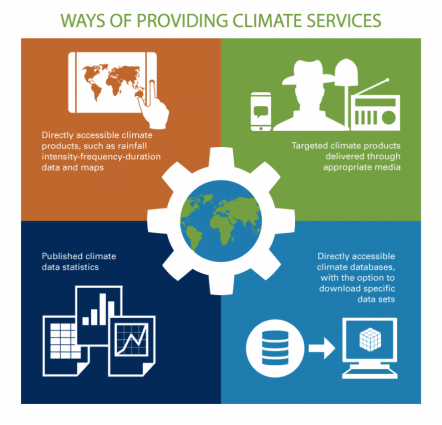Global climate change is not a future problem. We can already see the consequences of human-induced global warming such as melting glaciers, more intense heatwaves, and sea level rise. While there is no doubt among scientists that severe weather events will keep increasing in frequency and intensity in the coming years, climate services can play a key role in the adaptation process.
—
The Potential of Climate Services
Generally defined, climate services represent a decision aide obtained from climate information. This helps prepare societies for the weather conditions they will experience. The end-users are usually represented by various stakeholders at national, sub-national, or community levels. To make these systems work, it is crucial to understand users’ data requirements.
Another definition comes from the World Food Programme (WFP), which explains climate services as “the provision of climate information and products, such as agro-meteorological bulletins and crop weather calendars, to inform and assist in the decision-making process to manage climate-related risks”. These data can help communities predict, prepare and maybe even adapt to climate shocks.
Climate services are derived from national and international databases and contain high-quality data on temperature, rainfall, wind, soil moisture content, and ocean conditions as well as maps, risk and vulnerability analyses, assessments, and long-term projections. This climate information often needs to be combined with non-meteorological data, such as road and infrastructure maps or agricultural production.
To make climate services reliable, all the data must be based on scientifically credible information and expertise, focus on the needs of societies and be discussed by end-users and providers before the uptake. The climate services can speak to a large audience but can also be adjusted to a specific sector or a particular site.
The Global Framework for Climate Services
In 2009, the World Meteorological Organization (WMO) organised the World Climate Conference-3 (WCC-3) in Geneva with the goal of institute “an international framework for climate services that links science-based climate predictions and information with the management of climate-related risks and opportunities in support of adaptation to climate variability and change in both developed and developing countries”.
At the conference, the international community established ‘The Global Framework for Climate Services’ to allow better management of the risks related to changing climate and weather conditions and adjustment to global warming. These services “would help ensure that every country and every climate-sensitive sector of society is well equipped to access and apply the growing array of climate prediction and information services made possible by recent and emerging developments in international climate science and technology.”
Over the following decades, the priority is to ensure that every climate-sensitive sector of society can access the information services and climate prediction made by international science and developing technology.

Source: World Meterological Organization (WMO)
Climate Services Priority Areas
The main purpose of the establishment of The Global Framework for Climate Services was to provide a reliable and integrative platform for guiding and supporting climate adaptation and mitigation activities implemented within the investment areas that are highly climate-dependent, such as agriculture, energy sector disaster risk reduction, human health, and the water sector.
1. Agriculture and Food Security
Weather patterns have been changing significantly over the last decades and that is not favourable for crop planting or livestock farming. The number of extreme weather events, such as prolonged heatwaves, the severity of sudden rainfalls, and reduced snow cover just to name a few, is expected to recur even more often. Farming at higher altitudes might become more productive due to longer growing seasons, but on the other hand, arid and semi-arid areas of the world will struggle due to water shortages. Better understanding and ability to predict weather variability will help farmers cope with climate change.
You might also like: Can Traditional Farming Withstand Another Summer of Record-Breaking Heatwaves?
2. Disaster Risk Reduction
Natural hazards are extreme natural events often resulting in huge damages to the environment, properties, and human lives. Weather and climate-related disasters represent 90% of all the commonly reported events. With a growing population and expanding urban areas, humans will be inevitably more exposed to natural hazards. Each country must develop risk management strategies using an early warning system to minimise the casualties, and economic losses, to also build livelihood resilience.
3. Energy
Energy systems are the pillars of each country’s social and economic development. Indeed, energy is the backbone of all aspects of human welfare, whether we mention access to water, agricultural production, education, or environmental sustainability. Environmental planning and operations in general depend remarkably on meteorological conditions. Therefore, climate information will help energy systems to be more resilient in times of weather extremes and can significantly support the development and use of renewable energy sources.
4. Health
Climate change and climate variability can have major negative consequences on public health. Different weather extremes result in millions of injuries and premature deaths every year. Different rainfall levels and prolonged heatwaves can also help spread different infectious diseases. Climate information is essential in clinical practice and public health programming.
5. Water sector
Water is vital for our life. Climate change can drastically change the water quantity and quality and it is already affecting water sources for people around the world. Extreme weather events are making water scarcer and more polluted. Unpredictable weather also makes it very hard to estimate the water availability for the foreseen seasons. Weather and climate information can significantly help with water supply management.
You might also like: Water Shortage: Causes and Effects
Benefits of Climate Services
The use of weather and climate services can have broad benefits for societies as they enable individuals, households, businesses, or governments to decide on the actions that lessen the impacts of weather and climate. When looking at the socio-economic value of climate and weather services, it is estimated that with an investment of US$1 billion per year, upgrading early warning systems across developing countries could lead to between US$300 million and $2 billion of avoided asset losses besides saving around 23,000 lives each year.
Nowadays, 5-10% of national agricultural production losses are related to climate variability. However, as stated in the inaugural report on the State of Climate Services, which focuses on agriculture and food security: “Climate information and associated services have demonstrably led to improved agricultural and food security outcomes and benefits for stakeholders in the sector.” This means that the losses in agriculture and in other sectors can be reduced with the help of climate information.
Some Obstacles In Using Climate Services
Climate services represent important information about future climate variability which can help make decisions in a variety of sectors that are either more or less affected by the weather. However, information availability does not always guarantee its use in the decision-making process.
One of the main issues related to the usage of climate services is communication between scientists and the decision-makers (e.g. site managers, farmers, energy consultants etc.). Both use very different “languages” and in order to engage in fruitful collaborations, overcoming certain communication barriers is imperative.
Awareness is another common barrier. Incorporating climate data services into development planning comes with full comprehension of the issues involved in climate change adaptation. Unfortunately, there is a low level of awareness of climate change issues at the sub-national and local levels where incorporating climate services often takes place.
Another reason why many sectors do not wish to implement climate services is the lack of reliability. This barrier is often linked to existing perceptions of high levels of uncertainty, especially in long-range forecasting and lack of accuracy in weather predictions. Consequently, services become less reliable and thus less useful.
The Future of the Climate Services
According to the new EU Adaptation Strategy, climate services are extremely helpful in the process of adaptation to global warming. The interest in understanding and considering implementing these in decision-making processes has increased significantly since the 1970s.
There is lots of work to be done to see climate services used in every sector. But it must start with realising the urgent need for action. Climate change is a real threat to humanity and our planet and climate services can help minimise its devastating effects. They can also help increase productivity in the agricultural sector.
In 2017, UNESCO adopted six ethical principles with the Declaration of Ethical Principles in relation to Climate Change. One of them is the “scientific knowledge and integrity in decision-making”, meaning that “every decision needs to be guided by the best available knowledge and social science.” Based on this principle, climate services should definitely be part of the decisions made in each climate-sensitive sector.
You might also like: Project Drawdown: The World’s Leading Climate Solutions Database Is Growing


















